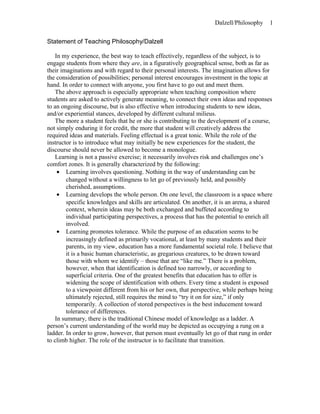
Engaging Students Through Open Discussion & Questioning Assumptions
- 1. Dalzell/Philosophy Statement of Teaching Philosophy/Dalzell In my experience, the best way to teach effectively, regardless of the subject, is to engage students from where they are, in a figuratively geographical sense, both as far as their imaginations and with regard to their personal interests. The imagination allows for the consideration of possibilities; personal interest encourages investment in the topic at hand. In order to connect with anyone, you first have to go out and meet them. The above approach is especially appropriate when teaching composition where students are asked to actively generate meaning, to connect their own ideas and responses to an ongoing discourse, but is also effective when introducing students to new ideas, and/or experiential stances, developed by different cultural milieus. The more a student feels that he or she is contributing to the development of a course, not simply enduring it for credit, the more that student will creatively address the required ideas and materials. Feeling effectual is a great tonic. While the role of the instructor is to introduce what may initially be new experiences for the student, the discourse should never be allowed to become a monologue. Learning is not a passive exercise; it necessarily involves risk and challenges one’s comfort zones. It is generally characterized by the following: • Learning involves questioning. Nothing in the way of understanding can be changed without a willingness to let go of previously held, and possibly cherished, assumptions. • Learning develops the whole person. On one level, the classroom is a space where specific knowledges and skills are articulated. On another, it is an arena, a shared context, wherein ideas may be both exchanged and buffeted according to individual participating perspectives, a process that has the potential to enrich all involved. • Learning promotes tolerance. While the purpose of an education seems to be increasingly defined as primarily vocational, at least by many students and their parents, in my view, education has a more fundamental societal role. I believe that it is a basic human characteristic, as gregarious creatures, to be drawn toward those with whom we identify – those that are “like me.” There is a problem, however, when that identification is defined too narrowly, or according to superficial criteria. One of the greatest benefits that education has to offer is widening the scope of identification with others. Every time a student is exposed to a viewpoint different from his or her own, that perspective, while perhaps being ultimately rejected, still requires the mind to “try it on for size,” if only temporarily. A collection of stored perspectives is the best inducement toward tolerance of differences. In summary, there is the traditional Chinese model of knowledge as a ladder. A person’s current understanding of the world may be depicted as occupying a rung on a ladder. In order to grow, however, that person must eventually let go of that rung in order to climb higher. The role of the instructor is to facilitate that transition. 1